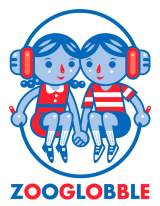Review: Blue Clouds - Elizabeth Mitchell and You Are My Flower
 Thursday, November 29, 2012 at 6:00PM
Thursday, November 29, 2012 at 6:00PM  How to sum up the latest album from Elizabeth Mitchell and You Are My Flower, the dream-soaked Blue Clouds?
How to sum up the latest album from Elizabeth Mitchell and You Are My Flower, the dream-soaked Blue Clouds?
I suppose one could start with that adjective, "dream-soaked." From the song lyrics (the frog and mouse courtship and wedding of "Froggie Went A-Courtin'" or the dogs running around in "Yuki (Snow)") to the album art from renowned author and artist Remy Charlip to the arrangements featuring Mitchell's direct and gentle voice and strings and flute, among others, the entire album seems suffused with sleepy imagery and feelings.
Or perhaps it's with a bullet-point recounting of the high points on the album:
- The total feeling of empathy generated by her cover of Bill Withers' "I Wish You Well."
- The title track (a lullaby written by Mitchell's husband Daniel Littleton), which wraps up the album and is an instant modern classic
- Her version of "Everyone," which recasts Van Morrison's joy-filled song into something akin to a blessing.
I could always compare and contrast with Mitchell's previous work. It's definitely more varied in scope than Little Seed, her fine Woody Guthrie tribute album from this summer. For the listeners to Sunny Day who wished that Mitchell front-and-center more often in that album, instead of ceding lead vocals to daughter Storey on some tracks (I was perfectly fine with the shift as I saw what Mitchell was aiming at in being part of the Folkways tradition), they will find the mix more like You Are My Little Bird -- the kids are integrated nicely on the tracks, but it's Mitchell show.
Or I could be very technical about the whole thing: 38 minutes in length, best for ages 3 through 9, more album details here or stream some songs here. Don't forget the physical packaging, typically Smithsonian-awesome, featuring Charlip's artwork, an introductory essay from author and artist Brian Selznick, and nice liner notes from Mitchell herself.
But instead the word I keep drifting back to is that of family. Mitchell's immediate family -- her, husband Daniel, daughter Storey -- who have always been at the heart of this whole enterprise and her approach to making a living as a musician in this field. Her extended family -- Brian Selznick not only writes a generous introduction, but it's dedicated to his friend Remy Charlip and the mother of his goddaughter Storey; her sister-in-law Anna Padgett writes a couple songs on the album. Her super-extended Folkways family -- Smithsonian heroes Ruth Crawford Seeger and Ella Jenkins inspire tunes. And my own family, who have been listening to Mitchell's music for more than a decade and have spent many (hundreds of) hours with her music. Mitchell pulls us all in and, for a moment, makes us feel connected before sending us back into the world to be as generous with others as she has been with us. Highly recommended.
 Stefan Shepherd | Comments Off |
Stefan Shepherd | Comments Off |  Brian Selznick,
Brian Selznick,  Elizabeth Mitchell,
Elizabeth Mitchell,  Ella Jenkins,
Ella Jenkins,  New York,
New York,  Remy Charlip,
Remy Charlip,  Ruth Crawford Seeger,
Ruth Crawford Seeger,  The Good Mrs. Padgett,
The Good Mrs. Padgett,  Van Morrison,
Van Morrison,  review,
review,  reviews in
reviews in  3,
3,  4,
4,  5,
5,  6,
6,  7,
7,  8,
8,  9,
9,  Reviews
Reviews 







